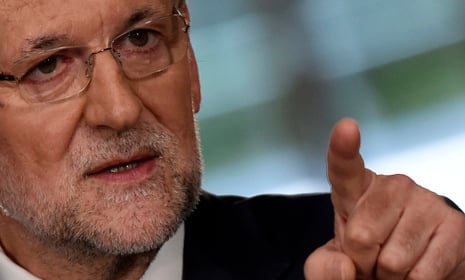Rajoy nevertheless warned of the economic risk posed by “political uncertainty” over the Catalonia region's drive to break away from Spain.
He said public sector staff will also recover part of their Christmas bonuses that he cut as part of 150 billion euros' ($166 billion) worth of cash-saving measures that fuelled angry street protests.
“The clear improvement in the economy allows us to reverse little by little the efforts that we have demanded from the Spanish people,” Rajoy said.
Public sector pay was cut in 2010 under the former Socialist government and frozen in the following years as recession engulfed Spain, sparked by the busting of a construction boom.
In 2012 Rajoy's conservative administration cut the Christmas bonus. He said on Friday workers would get a quarter of that bonus back this year and a further half in 2016.
The hikes were the headline changes in Rajoy's 2016 state budget, which he unveiled at a major twice-yearly press conference.
Rajoy's government had already approved an easing of income tax.
Spain emerged in 2013 from five years of on-off recession and the government forecasts the economy will grow 3.3 percent this year — more than twice the average forecast for eurozone countries.
Rajoy has forecast Spain will create 1,000,000 jobs overall in 2014-2015.
But its unemployment rate is still dire at more than 22 percent — the second-highest in the eurozone after that of bailed-out Greece.
The government has meanwhile been embarrassed by a series of corruption scandals that have fanned popular anger.
Rajoy said 53.5 percent of the new budget will be devoted to social spending, with 39 percent going on pensions.
Pensions will rise by 0.25 percent, the minimum amount set by law.
Rajoy will fight for re-election against a challenge from upstart protest parties in the polls due around late November.
He repeated his warning that Spain's recovery would be at risk if the left-wing Podemos party forces a change of course on the economy after the elections.
He says the government's tough austerity measures are to thank for stabilising Spain's public finances and returning the country to growth.
Spain's exports have risen and record numbers of tourists have been visiting.
Podemos was formed last year and its strong performance in regional elections in May has raised pressure on Rajoy.
Tension is also rising between his government and the northeastern region of Catalonia, where leaders are campaigning for independence from Spain.
Catalonia is expected next week to call its own regional election for September 27, in which a broad pro-independence alliance is running on the issue of independence.
Rajoy said on Friday he would not allow Catalonia to break away from Spain “by any means”.
“There are risks that come not from the economy but from political uncertainty,” he said.
“The first challenge is from the pro-independence movement and the breaking-away that the government of Catalonia has proposed.”
Along with Podemos and Catalonia, Rajoy said the ongoing uncertainty over Greece's debts posed a “third threat”.


 Please whitelist us to continue reading.
Please whitelist us to continue reading.